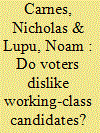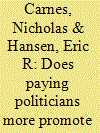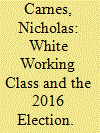|
|
|
Sort Order |
|
|
|
Items / Page
|
|
|
|
|
|
|
| Srl | Item |
| 1 |
ID:
149682


|
|
|
|
|
| Summary/Abstract |
In most democracies, lawmakers tend to be vastly better off than the citizens who elect them. Is that because voters prefer more affluent politicians over leaders from working-class backgrounds? In this article, we report the results of candidate choice experiments embedded in surveys in Britain, the United States, and Argentina. Using conjoint designs, we asked voters in these different contexts to choose between two hypothetical candidates, randomly varying several of the candidates’ personal characteristics, including whether they had worked in blue-collar or white-collar jobs. Contrary to the idea that voters prefer affluent politicians, the voters in our experiments viewed hypothetical candidates from the working class as equally qualified, more relatable, and just as likely to get their votes. Voters do not seem to be behind the shortage of working-class politicians. To the contrary, British, American, and Argentine voters seem perfectly willing to cast their ballots for working-class candidates.
|
|
|
|
|
|
|
|
|
|
|
|
|
|
|
|
| 2 |
ID:
149674


|
|
|
|
|
| Summary/Abstract |
If politicians in the United States were paid better, would more middle- and working-class people become politicians? Reformers often argue that the low salaries paid in state and local governments make holding office economically infeasible for lower-income citizens and contribute to the enduring numerical under-representation of the working class in our political institutions. Of course, raising politicians’ salaries could also make political office more attractive to affluent professionals, increasing competition for office and ultimately discouraging lower-income citizens from running and winning. In this article, we test these hypotheses using data on the salaries and economic backgrounds of state legislators. Contrary to the notion that paying politicians more promotes economic diversity, we find that the descriptive representation of the working class is the same or worse in states that pay legislators higher salaries. These findings have important implications for research on descriptive representation, political compensation, and political inequality.
|
|
|
|
|
|
|
|
|
|
|
|
|
|
|
|
| 3 |
ID:
178288


|
|
|
|
|
| Summary/Abstract |
Academics and political pundits alike attribute rising support for right-wing political options across advanced democracies to the working classes. In the United States, authors claim that the white working class offered unprecedented and crucial support for Donald Trump in the 2016 election. But what is the evidence for this claim? We examine all of the available academic survey data gathered around the election, along with a number of surveys from prior elections. We test four common claims about the white working class in 2016: (1) that most Trump voters were white working-class Americans; (2) that most white working-class voters supported Trump; (3) that unusually large numbers of white working-class voters switched from Obama in 2012 to Trump in 2016; and (4) that white working-class voters were pivotal to Trump’s victory in several swing states. We find that three of the four are not supported by the available data, and the other lacks crucial context that casts doubt on the idea that Trump uniquely appealed to working-class Americans. White working-class Americans have been supporting Republican presidential candidates at higher rates in recent elections, but that process long predates 2016, and narratives that center on Trump’s alleged appeal obscure this important long-term trend.
|
|
|
|
|
|
|
|
|
|
|
|
|
|
|
|
|
|
|
|
|